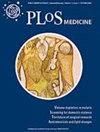新加坡高血压多成分干预纳入初级卫生保健服务的聚类随机对照试验
IF 9.9
1区 医学
Q1 MEDICINE, GENERAL & INTERNAL
引用次数: 4
摘要
背景:尽管有高血压管理的临床实践指南,但血压(BP)控制仍然不理想(20%),10年心血管风险评分(OR 0.67;95% ci: 0.47, 0.97;P = 0.03),较低的平均对数蛋白尿(- 0.22;95% ci:−0.41,−0.02;P = 0.03)。平均舒张压、死亡率和包括住院在内的严重不良事件在两组之间没有差异。主要的限制是在试验中没有掩蔽。结论:由接受过基于风险的治疗培训的医生、补贴的SPC药物、护士提供的激励谈话和电话随访组成的多组分干预可以改善血压控制并降低心血管风险。在我们的试验中,大规模实施多组分干预可能会降低全球高血压相关的发病率和死亡率。试验注册:Clinicaltrials.gov NCT02972619。本文章由计算机程序翻译,如有差异,请以英文原文为准。
Integration of a multicomponent intervention for hypertension into primary healthcare services in Singapore—A cluster randomized controlled trial
Background Despite availability of clinical practice guidelines for hypertension management, blood pressure (BP) control remains sub-optimal (<30%) even in high-income countries. This study aims to assess the effectiveness of a potentially scalable multicomponent intervention integrated into primary care system compared to usual care on BP control. Methods and findings A cluster-randomized controlled trial was conducted in 8 government clinics in Singapore. The trial enrolled 916 patients aged ≥40 years with uncontrolled hypertension (systolic BP (SBP) ≥140 mmHg or diastolic BP (DBP) ≥90 mmHg). Multicomponent intervention consisted of physician training in risk-based treatment of hypertension, subsidized losartan-HCTZ single-pill combination (SPC) medications, nurse training in motivational conversations (MCs), and telephone follow-ups. Usual care (controls) comprised of routine care in the clinics, no MC or telephone follow-ups, and no subsidy on SPCs. The primary outcome was mean SBP at 24 months’ post-baseline. Four clinics (447 patients) were randomized to intervention and 4 (469) to usual care. Patient enrolment commenced in January 2017, and follow-up was during December 2018 to September 2020. Analysis used intention-to-treat principles. The primary outcome was SBP at 24 months. BP at baseline, 12 and 24 months was modeled at the patient level in a likelihood-based, linear mixed model repeated measures analysis with treatment group, follow-up, treatment group × follow-up interaction as fixed effects, and random cluster (clinic) effects. A total of 766 (83.6%) patients completed 2-year follow-up. A total of 63 (14.1%) and 87 (18.6%) patients in intervention and in usual care, respectively, were lost to follow-up. At 24 months, the adjusted mean SBP was significantly lower in the intervention group compared to usual care (−3.3 mmHg; 95% CI: −6.34, −0.32; p = 0.03). The intervention led to higher BP control (odds ratio 1.51; 95% CI: 1.10, 2.09; p = 0.01), lower odds of high (>20%) 10-year cardiovascular risk score (OR 0.67; 95% CI: 0.47, 0.97; p = 0.03), and lower mean log albuminuria (−0.22; 95% CI: −0.41, −0.02; p = 0.03). Mean DBP, mortality rates, and serious adverse events including hospitalizations were not different between groups. The main limitation was no masking in the trial. Conclusions A multicomponent intervention consisting of physicians trained in risk-based treatment, subsidized SPC medications, nurse-delivered motivational conversation, and telephone follow-ups improved BP control and lowered cardiovascular risk. Wide-scale implementation of a multicomponent intervention such as the one in our trial is likely to reduce hypertension-related morbidity and mortality globally. Trial registration Trial Registration: Clinicaltrials.gov NCT02972619.
求助全文
通过发布文献求助,成功后即可免费获取论文全文。
去求助
来源期刊

PLoS Medicine
医学-医学:内科
CiteScore
21.60
自引率
0.60%
发文量
227
审稿时长
3 months
期刊介绍:
PLOS Medicine aims to be a leading platform for research and analysis on the global health challenges faced by humanity. The journal covers a wide range of topics, including biomedicine, the environment, society, and politics, that affect the well-being of individuals worldwide. It particularly highlights studies that contribute to clinical practice, health policy, or our understanding of disease mechanisms, with the ultimate goal of improving health outcomes in diverse settings.
Unwavering in its commitment to ethical standards, PLOS Medicine ensures integrity in medical publishing. This includes actively managing and transparently disclosing any conflicts of interest during the reporting, peer review, and publication processes. The journal promotes transparency by providing visibility into the review and publication procedures. It also encourages data sharing and the reuse of published work. Author rights are upheld, allowing them to retain copyright. Furthermore, PLOS Medicine strongly supports Open Access publishing, making research articles freely available to all without restrictions, facilitating widespread dissemination of knowledge. The journal does not endorse drug or medical device advertising and refrains from exclusive sales of reprints to avoid conflicts of interest.
 求助内容:
求助内容: 应助结果提醒方式:
应助结果提醒方式:


